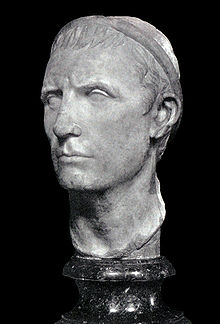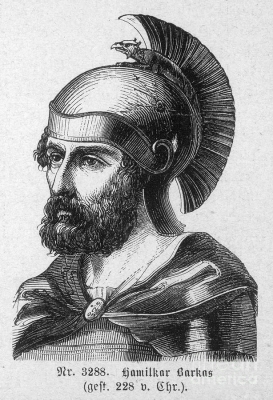 Mithridates became king when he was only twelve, and so, it was his mother who actually wielded power. However, when he was seventeen, he had his mother imprisoned, and seized power. He also killed off several of his brothers to eliminate any competition for the throne!
Mithridates became king when he was only twelve, and so, it was his mother who actually wielded power. However, when he was seventeen, he had his mother imprisoned, and seized power. He also killed off several of his brothers to eliminate any competition for the throne!
Mithridates invaded Bithynia, which was a Roman ally, and this brought him into conflict with Rome. Later, Roman general Sulla captured Athens, and defeated Mithridates at the Battle of Chaeronea in 86 BC. Mithridates fought three wars against the Romans. Eventually, he lost his kingdom, and died after being overthrown by one of his sons.
Today, Mithridates VI is remembered as one of the Roman Republic’s most persistent enemies, though he won only one major battle.


 Cornelius Sulla came to prominence mainly in the Social War that was fought from 91-89 BC. When in 88 BC, Mithridates, King of Pontus, attacked the Roman province in Asia; the senate decided that Sulla, who was then one of the current consuls, would be commander of the army against Mithridates. After successfully completing his campaign against Mithridates, Sulla returned to Italy, marched to Rome, and took charge politically by force, as a dictator.
Cornelius Sulla came to prominence mainly in the Social War that was fought from 91-89 BC. When in 88 BC, Mithridates, King of Pontus, attacked the Roman province in Asia; the senate decided that Sulla, who was then one of the current consuls, would be commander of the army against Mithridates. After successfully completing his campaign against Mithridates, Sulla returned to Italy, marched to Rome, and took charge politically by force, as a dictator. Gaius Marius was a Roman general and politician. He was a strong and brave soldier, and a skilful general, popular with his troops, but he showed little flair for politics, and was not a good public speaker.
Gaius Marius was a Roman general and politician. He was a strong and brave soldier, and a skilful general, popular with his troops, but he showed little flair for politics, and was not a good public speaker. Publius Cornelius Scipio was born into one of the great aristocratic families of Rome. Even as a boy, he proved his bravery when, seeing his father wounded and cut off by the enemy during a battle, he charged forward, and saved him. Scipio began his career as a military tribune. In 210, the Romans decided to send an army to Spain against the Carthaginians, but it is said that no senior general would undertake the task, and that young Scipio offered himself as a candidate. He was determined to hold the Carthaginian armies at bay, and prevent them from sending reinforcements to Hannibal in Italy. He was also determined to turn back the tide of war, and to drive the enemy out of the Peninsula.
Publius Cornelius Scipio was born into one of the great aristocratic families of Rome. Even as a boy, he proved his bravery when, seeing his father wounded and cut off by the enemy during a battle, he charged forward, and saved him. Scipio began his career as a military tribune. In 210, the Romans decided to send an army to Spain against the Carthaginians, but it is said that no senior general would undertake the task, and that young Scipio offered himself as a candidate. He was determined to hold the Carthaginian armies at bay, and prevent them from sending reinforcements to Hannibal in Italy. He was also determined to turn back the tide of war, and to drive the enemy out of the Peninsula. Philip V was one of the last great Macedonian sovereigns ruling from 221 to 179, whose attempt to extend Macedonian influence throughout Greece, resulted in his defeat by Rome.
Philip V was one of the last great Macedonian sovereigns ruling from 221 to 179, whose attempt to extend Macedonian influence throughout Greece, resulted in his defeat by Rome.

 Hamilcar Barca was a daring, intelligent young Carthaginian general He was assigned the command in Sicily in 247 in the First Punic War. From mountain bases he made repeated raids on the Romans. However, the Carthaginians were defeated, and Hamilcar Barca negotiated the terms of the peace that led to Carthage’s withdrawal from Sicily. Later, the Carthaginian mercenaries revolted, but Hamilcar defeated them in 238. After that his popularity made him a virtual dictator. He then set out to conquer Spain as a new base against Rome, and had won considerable territory when he died. Hamilcar was probably the ablest general and statesman that Carthage ever had, until he was succeeded by his son, Hannibal.
Hamilcar Barca was a daring, intelligent young Carthaginian general He was assigned the command in Sicily in 247 in the First Punic War. From mountain bases he made repeated raids on the Romans. However, the Carthaginians were defeated, and Hamilcar Barca negotiated the terms of the peace that led to Carthage’s withdrawal from Sicily. Later, the Carthaginian mercenaries revolted, but Hamilcar defeated them in 238. After that his popularity made him a virtual dictator. He then set out to conquer Spain as a new base against Rome, and had won considerable territory when he died. Hamilcar was probably the ablest general and statesman that Carthage ever had, until he was succeeded by his son, Hannibal.
 Quintas Fabius Maximus was a Roman commander and politician during the Second Punic War. He knew from the reports of Roman commanders in the field that it would be difficult to defeat Rome’s arch enemy Hannibal, in open battle. So, Fabius decided to fight a war of delaying tactics. He dispatched various Roman forces into the hills of Italy to tail Hannibal as closely as possible, without engaging him in battle, knowing that the cavalry would be useless in the hills. These troops constantly cut of Hannibal’s supply lines, and harassed him incessantly and without mercy. Although these tactics were unpopular, and viewed as cowardly, they worked. Fabius would make his first and only offensive move of the war in 209 during his fifth consulship, when he captured the city of Tarentum, which Hannibal had captured three years before.
Quintas Fabius Maximus was a Roman commander and politician during the Second Punic War. He knew from the reports of Roman commanders in the field that it would be difficult to defeat Rome’s arch enemy Hannibal, in open battle. So, Fabius decided to fight a war of delaying tactics. He dispatched various Roman forces into the hills of Italy to tail Hannibal as closely as possible, without engaging him in battle, knowing that the cavalry would be useless in the hills. These troops constantly cut of Hannibal’s supply lines, and harassed him incessantly and without mercy. Although these tactics were unpopular, and viewed as cowardly, they worked. Fabius would make his first and only offensive move of the war in 209 during his fifth consulship, when he captured the city of Tarentum, which Hannibal had captured three years before.